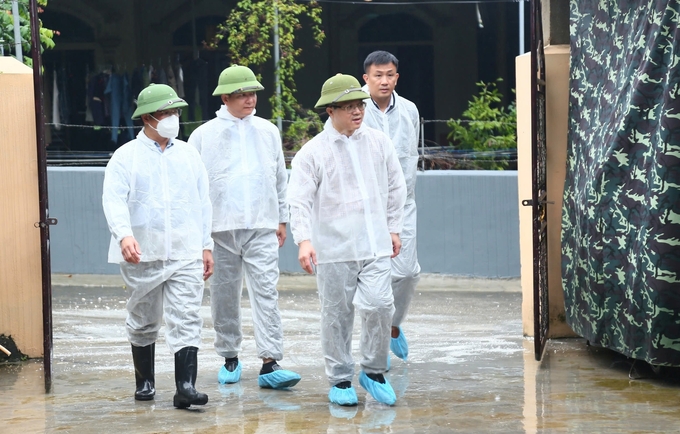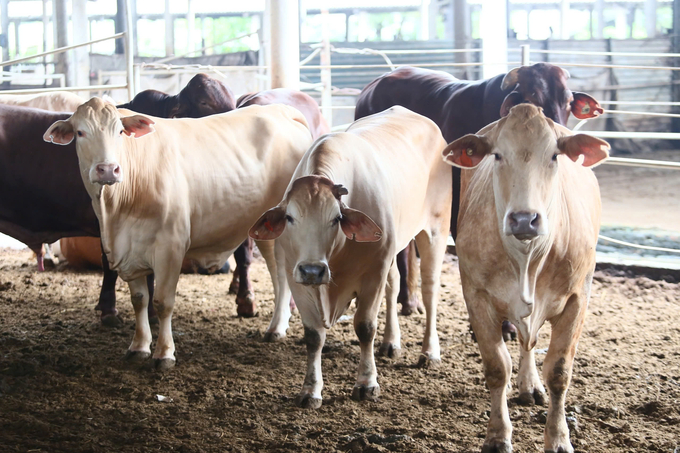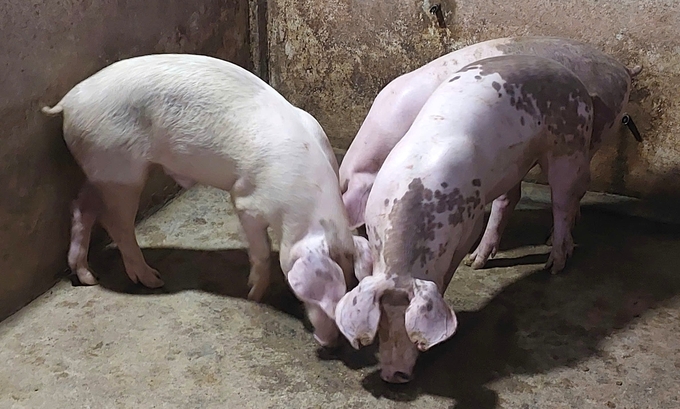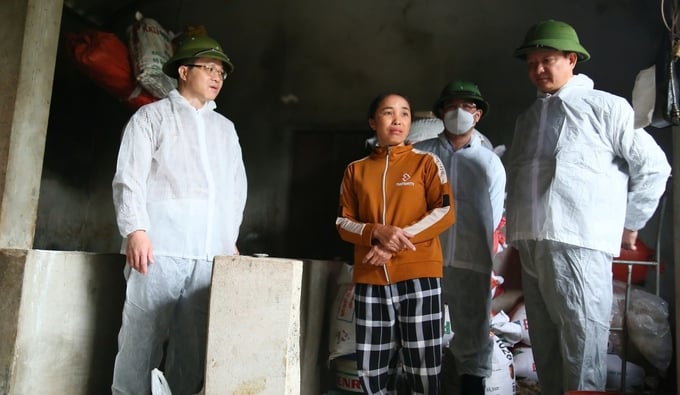June 18, 2025 | 11:42 GMT +7
June 18, 2025 | 11:42 GMT +7
Hotline: 0913.378.918
June 18, 2025 | 11:42 GMT +7
Hotline: 0913.378.918

Nguyen Van Long, Director of the Department of Animal Health (front row, right) directly inspected the epidemic situation in Nghe An. Photo: Viet Khanh.
On October 29, Nguyen Van Long, Director of the Department of Animal Health (Ministry of Agriculture and Rural Development) directly inspected the work of disease prevention and control and the construction of disease-free zones/facilities in Nghe An, a province with the biggest size of livestock and poultry herds in Vietnam.
Information from Nghe An Sub-Department of Livestock Production and Animal Health shows that despite facing many difficulties and challenges in recent years, the local livestock industry has maintained a fairly comprehensive growth rate. The growth rate of production value in 2023 is estimated at 5.7%, exceeding the planned target. The proportion of livestock in pure agriculture experiences a decent increase, estimated at 48%. The total output of fresh meat for slaughter reaches 279,322 tons.

Nghe An has one of the highest livestock herds in Vietnam. Photo: Viet Khanh.
As of October 2024, Nghe An has a total herd of over 800,000 buffaloes and cows, over 1 million pigs, and over 37 million poultry. However, the larger the number of livestock, the higher the risk of disease outbreaks, especially in the context of household-scale farming still accounting for a large proportion of the local industry.
Since the beginning of 2024, the whole province has recorded a number of epidemics in livestock, including African swine fever, lumpy skin disease, foot-and-mouth disease, avian influenza, rabies, etc. Thanks to proactive consultation and disease prevention work, epidemics have been handled in a timely manner.

Large livestock farming brings along many potential risks of diseases. Photo: Viet Khanh.
The current situation is under control, but Nghe An’s livestock industry cannot put aside its worries, which is completely reasonable considering the overall factors. Household and small-scale livestock farming methods plus unusual weather developments are major barriers during the disease prevention process.
It is forecasted that dangerous epidemics will continue to occur in livestock, poultry, and aquatic products in Nghe An. The unpredictable development of diseases has caused concern for the majority. In order to minimize risks, many large-scale livestock farms have proactively reduced their herd size, one of which is the household of Nguyen Canh Hoang, residing in Hamlet 1, Trang Son Commune, Do Luong District.

A working group from the Department of Animal Health gathers information on the current disease situation at a household livestock farm in Do Luong district, Nghe An. Photo: Viet Khanh.
“At its peak, my family owned a total herd of 400 - 500 pigs per year. Since the widespread outbreak of African swine fever, there have been many disruptions in the production chain. My farm has always been proactive in vaccinating and combining other response measures, so the situation is basically well controlled. However, it is difficult to predict all external risks. After thinking about it, reducing the herd is the most optimal solution, so I currently maintain only nearly 200 pigs,” said Nguyen Canh Hoang.

The Department of Animal Health and Nghe An Sub-Department of Livestock Production and Animal Health had a meeting to discuss disease response plans and find long-term solutions. Photo: Viet Khanh.
Discussing the solution, Dang Van Minh, Head of the Nghe An Department of Animal Husbandry and Veterinary Medicine, said, “Nghe An is a province with a large size of livestock herds. If only consumed domestically, supply will exceed demand”.
In accordance with the direction of the Government and the Ministry of Agriculture and Rural Development on exporting animal products specifically the Chinese market, Nghe An province has immediately registered and built a foot-and-mouth disease (FMD) safe zone in Nghia Dan district and Thai Hoa town.
The resources required to complete this goal are not small, thus demanding the State, businesses and people to work together. The province also encourages businesses operating in the livestock industry to invest in modern equipment and apply high-tech production procedures to increase economic value and prevent diseases effectively.

Director of the Department of Animal Health Nguyen Van Long affirmed that building disease-free zones will open up many opportunities for the livestock industry to develop. Photo: Viet Khanh.
The North Central region currently has 278 disease-free facilities and 2 commune-level disease-free zones in Quang Binh for rabies and classical swine fever, but there are no district-level disease-free zones. Nghe An's success in building them would be considered a major breakthrough for this province.
Translated by Samuel Pham

(VAN) According to the Binh Thuan Department of Industry and Trade, in the first five months of 2025, Binh Thuan's dragon fruit export turnover increased by 20.65% compared to the same period last year.

(VAN) EU countries on Thursday gave final approval to new tariffs on fertilizer imports from Russia, a move aimed at cutting off revenue that could support Moscow’s war in Ukraine, despite concerns from European farmers.

(VAN) The working delegation from the Ministry of Agriculture and Environment conducted an important trip to the Netherlands to strengthen strategic partnerships and sustainable development in the agricultural sector.

(VAN) The letter ‘A Plea from the Ocean’ not only evokes emotion but also awakens the human conscience to the responsibility of protecting life on Earth.

(VAN) The Department of Agriculture in South Africa has announced the country’s first mass vaccination of poultry to prevent local birds from contracting avian influenza.

(VAN) Establishment of the Mekong Delta Regional Agricultural Linkage Center, aiming for a closed value chain, deep processing, trading platforms, and international market connectivity.

(VAN) Gia Lai province has recently recorded 460 rare species of animals and plants, contributing to forest conservation and biodiversity planning in the region.